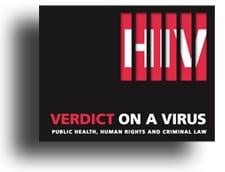More countries are making the transmission of HIV a crime, a trend that experts say will hamper prevention efforts.
According to a report released Nov 13 by the International Planned Parenthood Federation (IPPF), 58 countries have laws that punish people for transmitting HIV, including Canada. Another 35 countries are considering similar laws, says the report.
But criminal law has been shown to be an ineffective HIV prevention tool. The IPPF report hammers this point home.
“A simplistic ‘law-and-order’ response to HIV and the way in which individual court cases are reported in the media only serves to intensify a climate of denial, secrecy and fear,” says the IPPF. “This creates a fertile breeding ground for the continued and rapid spread of HIV.
The report suggests that governments are passing such laws out of “frustration” as HIV continues to spread. In countries with high HIV prevalence, governments want to give the appearance that they are doing something proactive. In countries with lower HIV prevalence, criminalization of HIV is a way to control “unacceptable” behaviour, suggests the report.
But criminalization is counter-productive to the goal of promoting public health, the IPPF argues. The report suggests criminalization can:
- Provide a disincentive for people to get tested for HIV. Ignorance of one’s status might be perceived as the best defence in a criminal lawsuit.
- Create a culture of blame, rather than one of ownership. Safer and responsible sexual behaviour is the responsibility of all partners.
- Breed false assumptions. If the law requires disclosure, people may assume that those who don’t disclose are automatically negative.
- Undermine human rights. Criminalization does not recognize the sensitivity and obstacles to disclosure and the right to privacy.
In Canada, the Supreme Court has ruled that a person must disclose their HIV-positive status before having sex that poses a “significant risk.” This includes anal and vaginal sex without a condom, but what else it includes is not fully clear, says the Canadian HIV/AIDS Legal Network. Since the year 2000, there has been a significant increase in the number of prosecutions brought forward each year, notes the Legal Network.
In Mar 2008, an Ontario court convicted Ryan Handy of aggravated sexual assault for failing to disclose his HIV-positive status before having unprotected sex. Handy was sentenced to eight months in jail. The accuser, who freely agreed to have unprotected sex, cannot be named because of a publication ban. The accuser did not become HIV positive from having sex with Handy.
Rather than criminalizing HIV, the IPPF suggests governments and policy makers should adopt the following five strategies:
- Create a protective and enabling legal environment, with laws based on evidence not prejudice.
- Meaningfully involve people living with HIV in the decisions that will affect their lives.
- Empower people living with HIV to have the knowledge to manage their health and have healthy lives.
- Promote a stigma-free and empowering environment.
- Adopt long-term strategies to address underlying inequalities, such as gender imbalances, racism and homophobia.

 Why you can trust Xtra
Why you can trust Xtra


